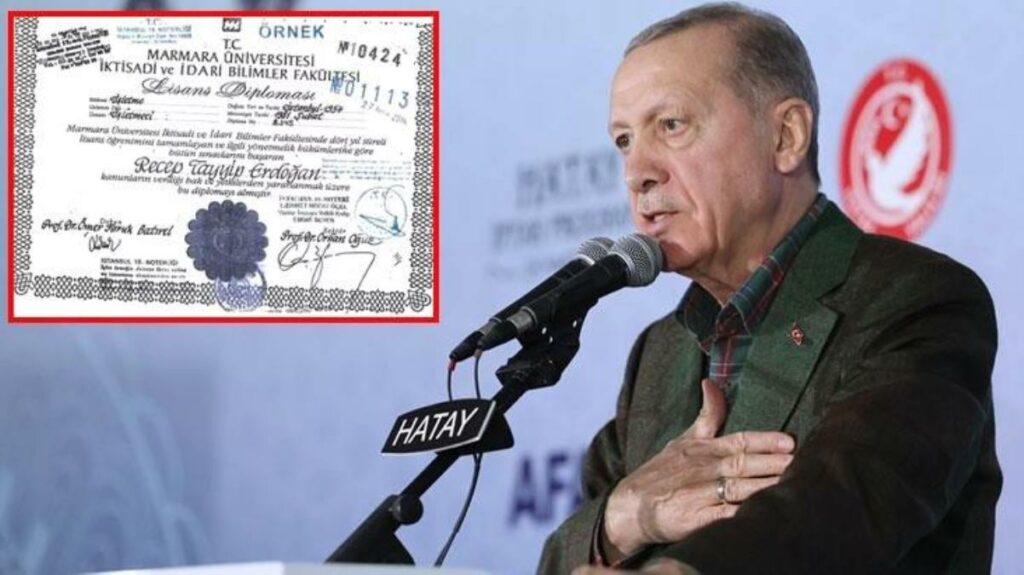Documents recently released by the Presidential Communications Directorate have failed to clear up doubts about the authenticity of Turkish President Recep Tayyip Erdoğan’s university diploma that have again surfaced before elections slated for May 14.
Aytun Çıray, İYİ (Good) Party MP and chief advisor to Chairwoman Meral Akşener, filed a petition with the Higher Education Council (YÖK) last week demanding the public release of Erdoğan’s university diploma, following former YÖK President Yusuf Ziya Özcan’s statement that he searched for the diploma during his tenure from 2007 to 2011 but was unable to find it.
Possessing a university degree is a prerequisite for holding the presidential office in Turkey, and the ongoing debate surrounding Erdoğan’s degree has persisted since his 2014 election. Erdoğan’s official biography claims he graduated from Marmara University’s economic and commercial sciences faculty in 1981. However, the university’s website indicates that the faculty was established in 1982, raising doubts about the authenticity of his diploma.
Marmara University issued a copy of Erdoğan’s diploma in 2016, but it named the “School of Business Administration” as his department, contradicting his previous claim of graduating from the faculty of economic and commercial sciences. Furthermore, the university’s diploma query system was shut down by court order in 2014, and none of Erdoğan’s college classmates have come forward to support his claims.
After the authenticity of Erdoğan’s degree again became the subject of debate, Presidential Communications Director Fahrettin Altun shared with the public some documents related to the president’s graduation through the Hürriyet daily.
The documents included what Altun claimed to be a certified copy of Erdoğan’s diploma, a certificate of graduation, the results of a university entrance exam from 1974 showing that Erdoğan would be eligible for admission to the faculty of economic and commercial sciences and a 1983 yearbook in which Erdoğan is listed among the graduates of Marmara University. The yearbook included the names and photos of the teaching staff at the time, in addition to those of the graduates.
The comments of legal experts and political scientists on social media, however, revealed that the documents published by Hürriyet weren’t enough to convince the public of the authenticity of Erdoğan’s diploma.
Lawyer Cemil Çiçek, a candidate for nomination as a lawmaker from the main opposition Republican People’s Party (CHP), said the diploma released by Altun was signed by “Prof. Dr. Ömer Faruk Batırel” in February 1981 but that Batırel became a professor in 1982.
Fahrettin Altun, Erdoğan'ın diplomasının noter onaylı örneğini paylaştı. Diploma 1981 yılı Şubat ayında Prof. Dr. Ömer Faruk Batırel tarafından imzalanmış gözüküyor. Fakat Ömer Faruk Batırel 1982 yılında Profesör unvanını kazandı. pic.twitter.com/sfpvbps6d0
— Cemil Çiçek (@avcemilcicek) March 25, 2023
Prof. Dr. Ahmet Saltık, an expert in health law and a political scientist, pointed out that the two graduates listed above and below Erdoğan in the yearbook were born in 1936 and 1939, respectively, while the president was born in 1954, which indicated an aberration in the list.
“Altun himself proved that Erdoğan’s diploma was fake! Did you make room for [Erdoğan] in the yearbook? Who was removed [so Erdoğan could replace him]? This forgery can be proven by [determining] the age of the ink,” Saltık said.
Diploma kayıt sırasında 1. kadın 1936 doğumlu, 2. sırada Erdoğan 1954 doğumlu, 3. sıradaki kadın 1939 doğumlu. F. Altun Erdoğan’ın diplomasının sahte olduğunu kendi kanıtladı! Diploma defterinde RTE'ye yer mi açıldı? Kim oradan çıkarıldı? Mürekkep yaşı ile anlaşılır bu sahtecilik pic.twitter.com/50TsxXMtqv
— Prof. Dr. AHMET SALTIK MD, BSc, LLM (@profsaltik) March 25, 2023
“After the fake diploma, they have now issued [other] fake documents,” former lawmaker and political analyst Feyzi İşbaşaran said in a tweet, explaining that the document number on the temporary graduation certificate previously released by Marmara University didn’t match the one on the certificate recently shared by Altun.
Goebbels Fahrettin ile Marmara Üniversitesinin yayınladığı kayıt numaraları da bir birini tutmuyor
Sahte diplomadan sonra şimdi de sahte evrak düzenlemek çoktı ortaya https://t.co/QI7AwEgsbi
— FEYZI ISBASARAN (@fyzisbsrn) March 25, 2023
The controversy surrounding President Erdoğan’s diploma has led to various actions by political figures and parties in Turkey. The latest took place in 2021, when the People’s Liberation Party (HKP), a left-wing populist and anti-expansionist political party, submitted an application to Marmara University demanding that detailed information on the president’s degree be shared with the public under Law No. 4982 on Right to Information. The university rejected the request, citing Law No. 6698 on the Protection of Personal Data.

